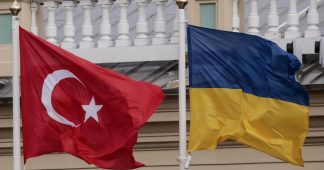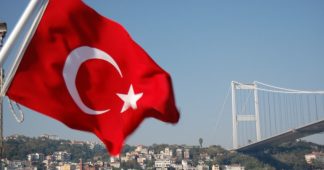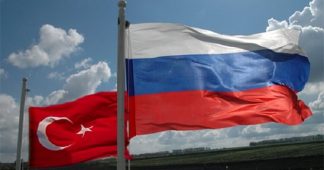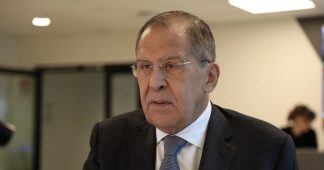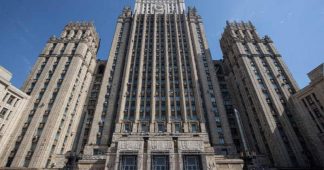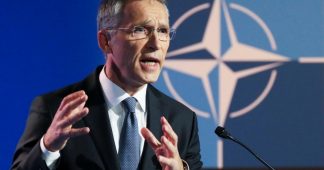By Rick Rozoff
Jun 21, 2021
The foreign ministers of Turkey and Ukraine, Mevlüt Çavuşoğlu and Dmytro Kuleba, met during the weekend’s three-day Antalya Diplomacy Forum in Turkey to discuss yet further strengthening bilateral military cooperation.
The Ukrainian Foreign Ministry disclosed this about the content of the meeting:
“Mevlüt Çavuşoğlu assured that Turkey would continue to support Ukraine’s Euro-Atlantic integration in all possible ways. The ministers discussed the possibilities of enhanced cooperation between the Ukrainian and Turkish navies which will help implement NATO standards in the Ukrainian Navy, increase their defense capabilities and interoperability with NATO member states, and generally strengthen cooperation between the countries for security in the Black Sea.”
Foreign Minister Kuleba expressed gratitude to Turkey for its steadfast support for its admission to NATO leading up to and during the June 14 NATO summit in Brussels. Ankara’s backing for Ukraine’s NATO accession is second to none in the 30-nation military bloc.
Kuleba told reporters at the conference that his nation is purchasing Turkish Bayraktar TB2 drones “because Turkish drones are very good,” and very good precisely in this context:
“Drones are needed to deter Russia so that Russia thinks twice, before planning, any escalation or any large-scale attack on Ukraine.”
The foreign minister added that Turkey and Ukraine are collaborating “very closely” on exploiting the issue of Crimean Tatars to give Moscow an additional headache. Turkey, fresh from supporting the 44-day Azerbaijani war against Nagorno-Karabakh, would surely not object to replicating the model of “liberating” a Turkic/Muslim brother people from Russian occupation. Ukraine’s designation of Crimea, one which Turkey faithfully echoes, is that of temporarily-occupied territory: the same way Turkey views that portion of Nagorno-Karabakh not yet “liberated,” and Abkhazia and South Ossetia, which its Georgian ally also proclaims occupied territories.
Turkey is accommodating Ukraine’s military buildup, assisting its war in the Donbass, facilitating its entrance into NATO and preparing it to confront Russia in the Black Sea as it incites Tatar separatism in Crimea.
The Turkish and Ukrainian foreign ministers also discussed plans for the impending 10th meeting of the High-Level Strategic Council chaired by presidents Volodymyr Zelensky and Recep Tayyip Erdoğan, and the next meeting of the two nations’ Quadriga format consisting of the defense and foreign ministers of both countries.
In April the Turkish and Ukrainian heads of state met in the Turkish capital for the most recent meeting of the High Level Strategic Council, which produced a twenty-point statement. In that document Turkey fully backs the position of Ukraine and its sponsors in the U.S., NATO and European Union in regard to forcing the Donetsk and Lugansk republics to return to Ukraine, driving Russia out of Crimea and granting NATO membership to Kiev. The Joint Declaration of the 9th meeting of the High-Level Strategic Council between Ukraine and the Republic of Turkey demands “the de-occupation of the Autonomous Republic of Crimea and the city of Sevastopol, as well as the territories in the Donetsk and Luhansk regions.”
After the April 10 meeting, the web page of the Ukrainian president confirmed that “all aspects of the strategic partnership between the two countries were considered at today’s meeting.” Zelensky was cited emphasizing commitments to joint work in the energy sphere and in weapons manufacturing. The energy factor involves among other matters the prospect of Ukraine connecting with the 1,100-mile Baku–Tbilisi–Ceyhan oil pipeline and the Baku-Tbilisi-Erzurum gas pipeline running from the Caspian Sea region to Turkey.
Zelensky stated that Turkish-Ukrainian defense cooperation is “the locomotive of the strategic partnership between the two countries.”
The last meeting of the Quadriga (2 + 2) was held on March 24, also in Ankara. The four ministers issued a joint statement afterward which in part reads:
“National coordinators discussed ways to deepen cooperation between Ukraine and Turkey in the field of security and defense to restore stability and security in the Black Sea region, and to further develop cooperation in the defense industry. A separate topic of the consultations was the current situation on the Crimean peninsula temporarily occupied by the Russian Federation and the territories of Donetsk and Luhansk regions….The participants in the consultations exchanged views on the prospects for resolving conflicts in the regions of the Middle East, North Africa, the Eastern Mediterranean and the Caucasus.”
Shortly before that meeting Armenian Lebanese scholar Yeghia Tashjian warned:
“[My] greatest fear is on a regional level. It is no secret that Ukraine is preparing for war or at least triggering an armed conflict in Russian-controlled Donbass with Turkish and Western blessings. It has been two weeks since I began monitoring the Ukrainian and Russian army’s supply routes and deployment of heavy weapons near Donbass. Kyiv, motivated by the Turkish and Azerbaijani victory in Artsakh [Nagorno-Karabakh], tried to establish military relations with Turkey and bought Turkish Bayraktar TB2 drones. Russia, aware that it may engage in a two-front war and knowing well that Armenia cannot defend itself against another Turkish-Azerbaijani invasion, is consolidating its presence in southern Armenia by building military posts and reopening the abandoned airfield of Sisian in Syunik.”
When the news about the discussions between the Turkish and Ukrainian foreign ministers became public, Russian Foreign Minister Sergei Lavrov issued this characteristically tepid statement:
“We have made our position in regards to attempts to pull Ukraine into NATO very unambiguous. I have no doubts that serious, responsible states understand very clearly, what we mean. We plan another contact within our regular dialogue with the Turkish colleagues. I believe we will discuss this topic as well, of course.”
A couple of says earlier, when asked about Turkey considering opening a military base in conquered Nagorno-Karabakh – the statement was made by the Turkish president himself and published in the Turkish press – Lavrov shrugged his shoulders and said, “I don’t respond to rumors.”
As to how truly concerned the Russian government is about the behavior of its Turkish colleagues, this effusion by President Vladimir Putin’s spokesman Dmitry Peskov a few weeks ago should clarify matters:
“Turkey and Turkey’s commitment to its independent course of development, which is quite firm, are generally the subject for heightened attention and, perhaps, concern at NATO. And, of course, this is a subject of US concern and the way the United States is trying to raise its voice at Ankara…obviously indicate that Washington does not like how [Turkish President Recep Tayyip] Erdogan is confidently leading Turkey forward and that they would prefer a more compliant Turkey.”
Published at antibellum679354512.wordpress.com
